
We are in a period of uncertainty, anxiety, and confusion. How do we come together to support each other, stay productive, and stay safe? How do we continue to advance our values of environmental and social justice? How do we make good decisions and not let fear drive us apart from our care for the earth and each other?
For those in the Cornell community that are still seeking opportunities to work on sustainability and justice, we’ve collected these resources.
Hopefully, there are some ideas you may not have considered, and some others you are already doing. If you have other ideas to add, please contact us at sustainability@cornell.edu and we can update this list.
Be well,
The Campus Sustainability Office Team
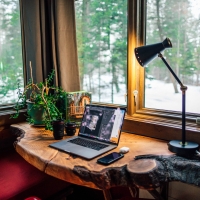 | Working / from HomeIf you are an essential worker still working to a physical job site, understand that the most important "sustainability" action you can take is to protect the health wellbeing of yourself and your family. For those now remote-working or using online services to get your work done, congratulations, you are already reducing your footprint! Tele-commuting can cut down on transportation miles and often the technology provider is powered by clean energy (see Microsoft, Adobe, and Google). Our Green Office program and Sustainability Life Recipes may help you at home if you are looking for ways to go green or save money. Join or start a Green Team from home, too! Cornell University libraries are still available to support sustainability academic work. Visit this resource page or contact them directly. | |
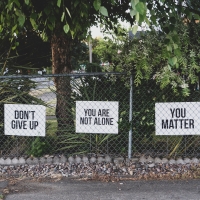 | Physical distancing, not social distancingOne of the things that make societies resilient is our social infrastructure. Our network of friends and family help us in difficult times so reach out, connect, but do it in a safe manner. This article has a number of creative ideas to connect and avoid undue risk. Care for ourselves and others is at the core of our Cornell values during COVID-19. Spend ten minutes a day tending to your own mental wellbeing, or that of someone else. Cornell HR has many mental wellbeing resources to consider. Feeling alone? Well, you're not alone. Consider volunteering your time to help others. Tompkins County Mutual Aid is helping neighbors help each other and has many ways you can participate, even from your own home. Here are some other ideas from the New York Times on how to think about your impact while maintaining changed behavior. | |
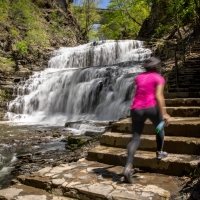 | Get outdoorsJust because we have to reduce exposure, doesn’t mean we need to be trapped inside. If you are feeling well and the weather allows, go for a walk, run, or bike ride. The Cornell Botanic Gardens and Sustainable Landscape Trail are open on campus. Birds and wildlife are starting to awaken from the winter and it’s a great time to get out and soak up some sun. GoFingerLakes.org is a terrific resource for finding hikes near you. Ithaca is fortunate to have an exceptional Urban Forest you might enjoy. Now is also a great time to start victory gardening; Cornell Cooperative Extension Events has online classes on how to build a raised garden bed, start your compost at home, and much more. You can talk to a real gardener using Ask the Growline. Starting plants from seed? This Seed Starting Academy is free. | |
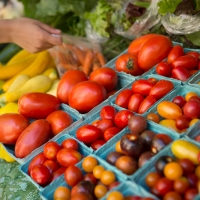 | Eat HealthyBuying local will keep our economy thriving, and can help you provide nourishing food for your family while avoiding crowded grocery stores. Support local farmers or try Buy Local NY.org for more than 400 farms and producers in Tompkins, Tioga, Schuyler, Chemung and Cortland Counties with pick-up & delivery. The Ithaca Farmers Market has re-opened on Saturdays at Steamboat landing with new COVID-19 hours and rules. If you are able, consider ordering take out once a week to help keep local restaurants afloat while business is slowed. Directory of Tompkins County Restaurants is a great resource. | |
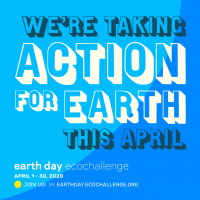 | Celebrate Sustainability MonthApril is Sustainability Month at Cornell, and this year, the University is joining in national celebrations for the 50th Anniversary of Earth Day by encouraging all community members to take the EarthDay EcoChallenge. Get started by selecting actions you can commit to - they have all been tailored to be COVID-19 friendly. There are lots of other virtual events to join, too! | |
 | Climate Change & COVID-19We are seeing an environmental impact from the spread of this virus. Air travel has been vastly reduced. Industries have closed and air quality in these areas has benefitted. At the same time work to address climate, from research to installing clean energy has been negatively impacted. So what should we learn about climate change in understanding this public health emergency?
|
What other ideas do you have about what sustainability looks like during this time? If you have other ideas to add, please contact us at sustainability@cornell.edu and we can update this list.
